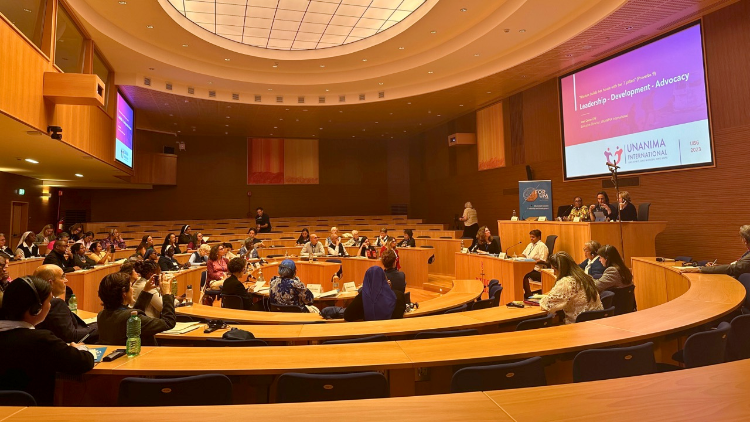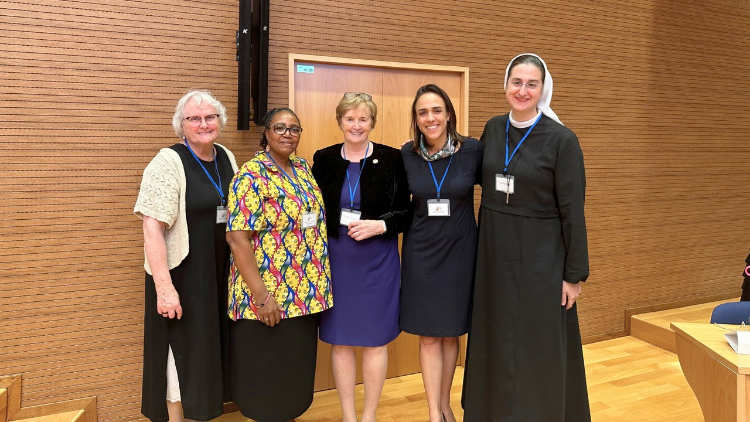The 2023 UISG Advocacy Forum brings religious women from around the world to Rome to discuss their work on issues such as climate change, poverty, human trafficking, and migration.
By Sr. Nina Benedikta Krapić, VMZ
The two-day UISG Advocacy Forum 2023 kicked off in Rome on Monday, 23 October, at the General Curia of the Society of Jesus. The Forum is an initiative of the International Union of Superiors General (UISG) in collaboration with the Global Solidarity Fund.
The Forum takes a multi-thematic approach, recognising the interconnected nature of the most pressing challenges impacting development of societies and the planet.
Many of the speakers at the event are experts working in advocacy for the most vulnerable people and most complex issues of our time, such as climate change and biodiversity loss, poverty, unemployment and social inequality, forced migration and human trafficking, health crises, and violations of human rights.
The Forum is intended to be a platform for the identification of priority areas for national, regional and international advocacy that can lead to systemic change, linking traditional wisdom and spirituality to emerging needs derived from rapid transformation of our societies.
Priorities can be addressed and systemic changes can be made only by working from the grassroots. Religious sisters have power to bridge that gap, and they are working with the marginalised all over the world.
Religious women present at the Forum are sharing their expertise, such as advocating on the global level in the United Nations, and sharing their stories on how serving people can lead to systemic change.
Sisters working at the grassroots
Australia’s Ambassador to the Holy See, Chiara Porro, chaired the opening panel, speaking on the theme: “Religious women: leadership and development”. On the panel, religious sisters who act as representatives at UN had a chance to talk about the importance of advocating and working together.
After chairing the panel, Ambassador Porro spoke to Vatican News to say that events like this Forum are “incredibly important”, first of all for chances to network and support religious sisters in their work.
“The religious women are working at the grassroots level all around the world, and so they have a very unique perspective to offer. It’s very important that they have a seat at the table and that their voices are heard because they have such a unique perspective to bring,” said Ambassador Porro.
Ambassador Porro points out the diversity of issues that sisters work on range from the protection of the environment to the protection of victims of human trafficking. “They’re really working at the margins with the most vulnerable.”
“It’s incredibly important to have events such as this to be able to support, to allow for them to network and support their work, to really get their voices out there and heard,” she concluded.

The Forum takes place at the Jesuit General Curia
Sisters’ stories from the ground must be addressed globally
Sr. Jean Quinn, who represents women religious at the UN, is the executive director of UNANIMA International, which represents 25 Congregations and more than 26,000 members, advocating for people in need.
Sr. Quinn spoke to Vatican News about connecting local and global levels.
She highlighted the importance of sisters working at the grassroots while others work as representatives at the global level, “because there’s something about the authenticity of the grassroots,” she said.
“They’re working with people in extreme poverty, displacement, that are affected by climate change and who better to bring it to the UN but actually the sisters working on the ground,” said Sr. Quinn, adding that UN member states feel there is an authenticity coming from religious sisters.
Together sisters can respond to needs of the world
“Events like this one bring people together so that we can hear other people’s experiences and then work as a group to respond to the needs of the world,” said Sr. Wamuyu Teresa Wachira, co-president of Pax Christi International, in an interview with Vatican News.
“You will discover that people are doing similar things, but when people come together then they have a bigger voice in addressing the needs of our world,” she added.
Sr. Wachira highlighted the work of Pax Christi to listen to people enduring violent situations, noting that close contact with victims is the only way to enhance the development of nonviolent approaches.
She shared the examples of religious sisters teaching local people how to employ nonviolent approaches.
“In Africa and Congo, people are experiencing violence, but they have chosen to act nonviolent,” she said.
The UISG Forum aims to stimulate an advocacy and action-oriented conversation to promote and implement sustainable lifestyles, social and economic practices, respectful of the needs of the most vulnerable people, and communities guided by spirituality, solidarity and non-discrimination.



